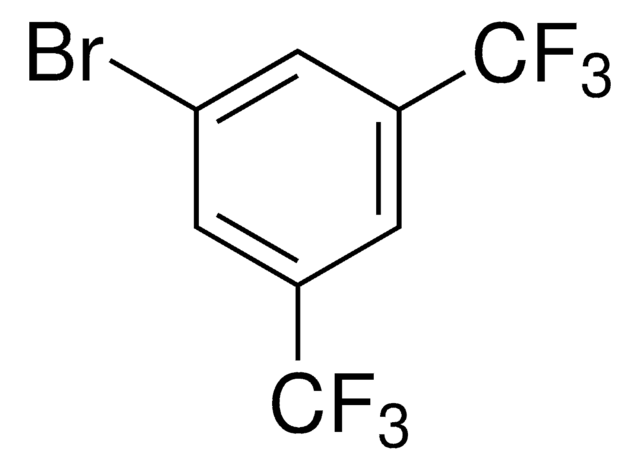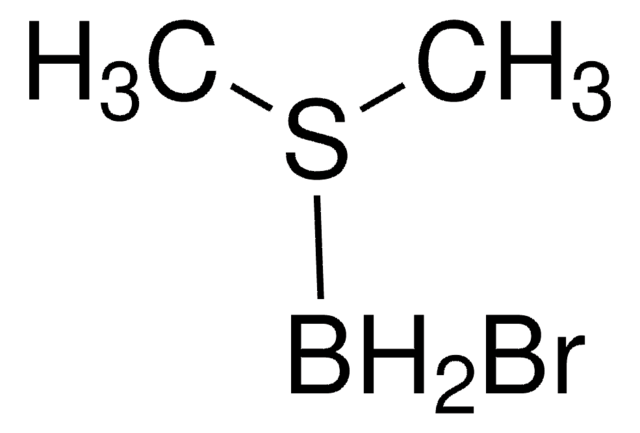307629
Boron triiodide
95%
Synonym(s):
Boron iodide (BI3), Triiodoborane
Sign Into View Organizational & Contract Pricing
All Photos(2)
About This Item
Empirical Formula (Hill Notation):
BI3
CAS Number:
Molecular Weight:
391.52
EC Number:
MDL number:
UNSPSC Code:
12352101
PubChem Substance ID:
NACRES:
NA.22
Recommended Products
Quality Level
Assay
95%
form
solid
density
3.35 g/mL at 25 °C (lit.)
storage temp.
2-8°C
SMILES string
IB(I)I
InChI
1S/BI3/c2-1(3)4
InChI key
YMEKEHSRPZAOGO-UHFFFAOYSA-N
Looking for similar products? Visit Product Comparison Guide
General description
Boron triiodide is a strong Lewis acid. It can be prepared by treating iodine (I2) with potassium borohydride (KBH4) in heptane.
Application
Boron triiodide can be used as a reagent to cleave C-O bonds in ethers, esters, and alcohols. It can also be used to cleave silanes and halides. Boron triiodide converts alcohols to alkyl iodides; sulfonyl and sulfinyl to disulfides. Borylation of triarylamines can be achievd using this reagent.
It can also be used to prepare imidazole based imino aluminum dihalide metal complexes and boron carbonitride (BCN) nanowires.
It can also be used to prepare imidazole based imino aluminum dihalide metal complexes and boron carbonitride (BCN) nanowires.
Signal Word
Danger
Hazard Statements
Precautionary Statements
Hazard Classifications
Skin Corr. 1B
Storage Class Code
8A - Combustible corrosive hazardous materials
WGK
WGK 3
Flash Point(F)
Not applicable
Flash Point(C)
Not applicable
Personal Protective Equipment
dust mask type N95 (US), Eyeshields, Gloves
Choose from one of the most recent versions:
Already Own This Product?
Find documentation for the products that you have recently purchased in the Document Library.
Customers Also Viewed
Synthesis, characterization and reactivity of an imidazolin-2-iminato aluminium dihydride
Franz D, et al.
Dalton Transactions, 43(11), 4451-4461 (2014)
Boron Triiodide
Ronald R and Karatholuvhu MS
Encyclopedia of Reagents for Organic Synthesis, Second Edition (2001)
Multiple Electrophilic C-H Borylation of Arenes Using Boron Triiodide
Oda S, et al.
Organic Letters, 22(2), 700-704 (2020)
Synthesis and growth mechanism of BCN nanowires
Yin Y and Chen Y
Materials Letters, 65(15-16), 2476-2478 (2011)
Daniel Franz et al.
Dalton transactions (Cambridge, England : 2003), 43(11), 4451-4461 (2013-12-18)
The reaction of bis(2,6-diisopropylphenyl)imidazolin-2-imine (LH, 1) with Me3N·AlH3 furnishes {μ-LAlH2}2 (2). The marked tendency of 2 to release its hydride substituents is ascribed to the strong electron-donor character of the imidazolin-2-iminato ligand. This is supported by its reactivity study and
Our team of scientists has experience in all areas of research including Life Science, Material Science, Chemical Synthesis, Chromatography, Analytical and many others.
Contact Technical Service

![Sodium tetrakis[3,5-bis(trifluoromethyl)phenyl]borate](/deepweb/assets/sigmaaldrich/product/structures/251/439/7a621e74-bfd1-4a43-833c-09adfcc1e0b3/640/7a621e74-bfd1-4a43-833c-09adfcc1e0b3.png)







